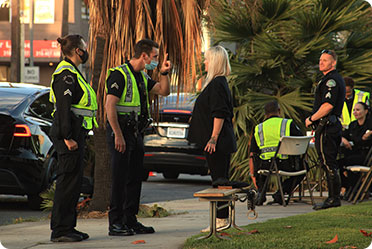
Anyone that has been driving for more than a year has likely had a run-in with an officer. This could be something as simple as driving through a check-point roadblock, or being stopped for failing to stop at a Stop sign. Whatever the case may by, police officers in general must have a reason for pulling someone over. When a DWI / DUI charge is involved, things get a little more difficult.
Reasonable Suspicion Defined
Basically, reasonable suspicion works in the following way: if a cautious, reasonable police officer witnessed your actions, would that person think that a crime has been committed? For instance, if you saw someone wearing all black clothing and they threw a rock through the front window of a bank, would you THINK that a crime is being committed? Without a doubt you would say yes to this question. So, when a police officer stops someone for the suspicion of driving under the influence of alcohol or other items, the officer must have reasonable suspicion for stopping the driver.
Examples Of Reasonable Suspicion For A DWI / DUI Stop
There are numerous examples of actions that would prompt an officer to pull someone over.
Items such as :
- Illegal turning
- Aimlessly drifting from one driving lane to another
- Riding on top of the land divider
- Near misses with other automobiles or roadside objects
- Extremely slow driving
- Stopping in the road without an apparent reason
- Frequent braking
Once again, going back to the basic definition, if a reasonable and cautious police officer witnessed any of the above acts, he or she would think that the driver of the automobile was encountering some kind of problem that is interfering with the ability to drive.
The Responsibility Of Proof On The Part Of The Officer
As you can see, an officer cannot simply pull over someone that is obeying all traffic laws and driving in a manner that is safe. Along these same lines, police officers have the responsibility to prove their point in a court of law. If an officer chooses to pull someone over, conduct field sobriety tests and ultimately arrest a person on the charge of DWI / DUI, then the officer must have specific facts for each point. The officer must clearly state which laws the driver was breaking when the officer decided to make the stop. If a field sobriety test or tests are conducted then the officer must outline what the test are, how the suspect is to perform the tests and make notes of the suspect’s performance of the tests. Without this documented evidence, the case can be dismissed in court.
What If The Officer Did Not Actually Witness Any Driving?
There are some situations in which the driver did not actually see the person driving but the suspect is still arrested and charged with DWI / DUI. Once again, the officer will have to document reasons for the arrest and the charge. Examples of this type of situation may be:
- Automobile accident – If you have been involved in an accident the officer may conduct field tests to determine if you have been using alcohol or drugs in order to charge you with DWI / DUI.
- Call From a Witness – If a credible witness calls the local authorities and accurately describe your driving in a manner that causes officers to feel you are in danger of harming yourself or others, you may be stopped and questioned.
- Parked Vehicle – There have been instances in which people were found passed out, behind the wheel of their parked cars, by officers. Pennsylvania and New Jersey have laws that allow officers to question you and possibly arrest you based on the fact that you have the potential and the access to use the vehicle.
As you can see there is a strong burden placed upon officers to provide sufficient reasons for stopping individuals in the first place. If an officer should mishandle any of the steps involved with proving you were under the influence of a drug or alcohol, it is possible to win your case. This is yet another reason why people should contact a local DWI / DUI attorney as soon as they have been arrested.
Leckerman Law focuses on safeguarding the
rights of individuals charged with DUI, DWI, DAI, and
other alcohol-related criminal offenses - Call Us Now For
NJ DWI (856) 429-2323 | For PA DUI (215) 496-9292